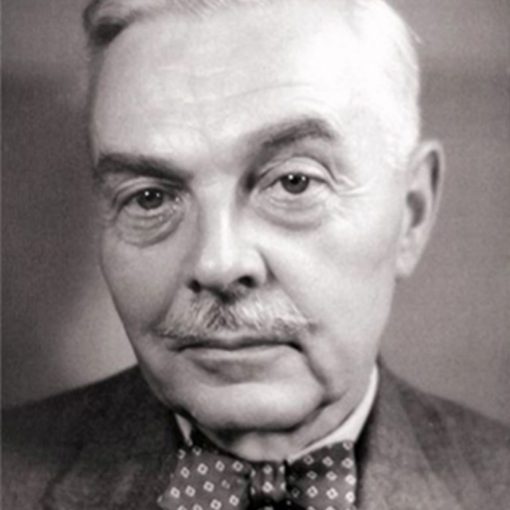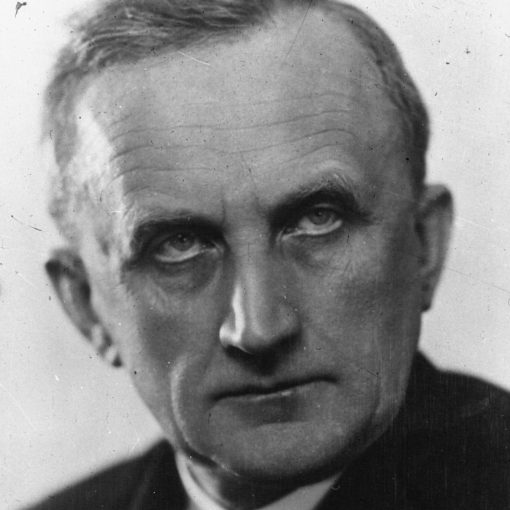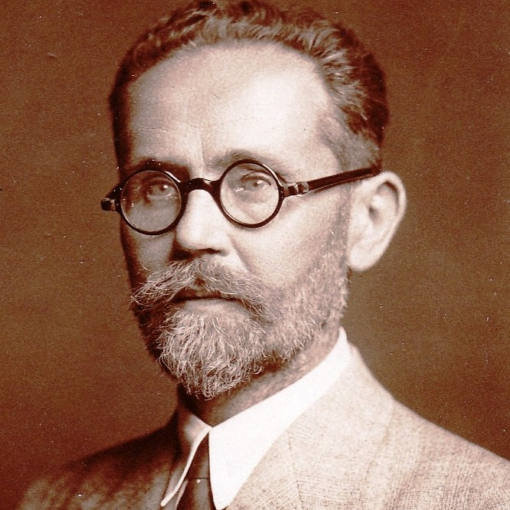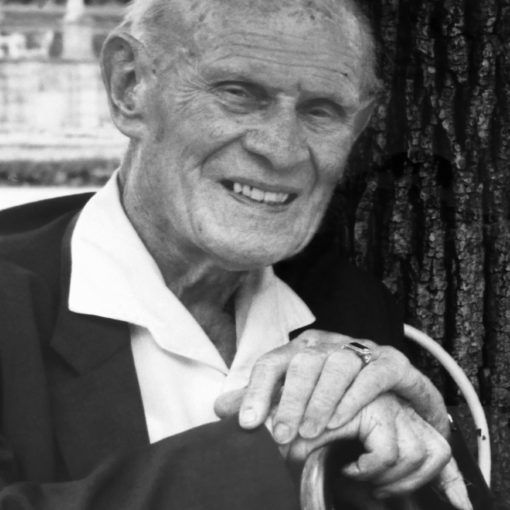The founding of the Národ Lodge 100 years ago would have never happened without an active initiator in the background, who never became its regular member. We can read various things about him from historical sources – politic, diplomat, journalist, writer. And also a Freemason of the Scottish Rite. His name was Ugo Dadone. He brought the Light to the Národ Lodge, he was a close friend and Masonic patron of our founding Brethren. Also, he was an adventurer and a controversial political figure. After all, what in the politics of the 20th century could be marked from the modern view as non-controversial?
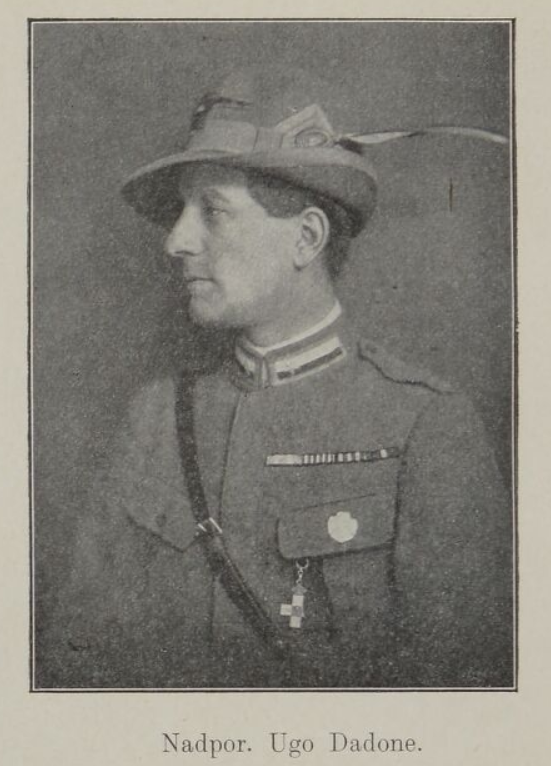
Ugo Dadone was born in a small town of Agropoli near Naples on 3rd June 1886. His father Andrea was a rail engineer, who worked on the project of the railway, connecting the north and the south of Italy. His mother was Ernesta, born De Benedetti. Ugo studied at a classical grammar school, although not fully finished. He was initiated to Freemasonry in 1908, being 22 years old. By that time, he had been already working as a journalist, starting with local journalism. Around 1911, he started friendly meetings with Gabriel d’Annunzio, a fashionable Italian writer, who was in that time the only Italian writer famous even outside Italy. Shortly before that, he met the love of his life, a year older Markéta Kašparová, eleventh out of twelve children of a wealthy Czech industrialist from Pardubice. Ugo and Markéta met in Venice, where Kašpar sisters were going for a summer stay in Porto Rose. Having their mother already deceased, the older sisters accompanied the younger ones. It was supposedly a love ‘colpo di fulmine’ (strike of lightning), meaning love at first sight. The same year, they married in Prague. Ugo and Markéta lived between Prague and Italy for many years.
Ugo Dadone returned to Italy just before the outbreak of WWI in 1914 and started there his true career as a journalist. Being influenced by the thoughts of his friend d’Anuzzio, who was a propagator of Italian military involvement, Dadone started to cooperate with Roberto Farinacci, one of the main promoters of the Italian interventionism and later prominent person of the Italian fascist regime. He also actively cooperates with brothers Arnaldo and Benito Mussolini on the project of the fascist newspaper ‘Il Popolo d’Italia’. As he confessed after years, their relations were very cordial. However, Dadone himself claimed that they were always somehow affected by his critical angle of view, which made him many enemies among the cream of the fascist society.

During the War, he served at the infantry, was wounded and limped visibly till his death. After his war injury, he actively participated in Italian war politics. Thanks to his language capabilities (he spoke six languages, including Czech) and his good relations with Czech political elites, he became a special courier of the Italian war prime minister Orlando with a message to T. G. Masaryk. Close to our first future president, he stayed as an Italian observer at the Czech General Staff and became even an active part of Czechoslovak legions. Therefore, after the War, he returned to Prague in a legionary uniform with the status of a hero, maintaining secret contact with Bohemian resistant group, called Maffie, whose members later became founders of the first fully Czech Masonic Národ Lodge in Prague.
I told Dr Rašín about my idea to establish a Masonic Lodge as a revolutionary organisation of the underground activity, which we could connect to the underground network of Maffia. Dr Rašín accepted my proposal nearly immediatelly. He praised mainly my reasons to establish a legal base for gathering within a Masonic Lodge, where an underground activity could take place in a form of Masonic works. This way seemed to be feasible. The Masonic activity was forbidden in the Austro-Hungarian Empire but not persecuted. All Masonic activities took place under the supersvision of the civil service. We would change the philantropic Masonic programme for our revolutionary programme about the fight to liberation and show only the philantropic face to the public, which could have many changing forms during the War.
At that time, we have been meeting an Italian Mason Ugo Dadone. I knew him from the pre-war times, when he taught me, along with Ing. Dvořáček, the Italian language. He served unofficially at the Italian Consulate in Prague and we saw that his main task after the outbreak of the War was to collect the news from the Czech life, mainly political, economic and military. I trusted him personally. He was a fanatical supporter of the programme of the Italian irrendenta in Austria, he believed that Italy would join the Entente Powers and declared war on Austria, so that Italian regions in Austria could unite with Italy. I knew that he was for the war of Italy against Austria and he assured me that shortly after the outbreak of the War, Italy would declare war on the Triple Alliance countries. He was giving me foreign newspapers and military news, which he had from the Italian consulate. I was sure that he was not an Austrian agent but that he really was in Italian services. I asked him about the possibility to establish a Masonic Lodge in Prague with a help of the Italian Freemasonry. Dadone sent a request to the Grand National Lodge of Italy through the Italian consulate. He received a positive response that it is possible accept chosen people as members of a Roman Lodge and then form a Czech Lodge in Prague as true Italian Masons.
From memories of František Sís, the first Worshipful Master of the Národ Lodge
Ugo Dadone played a key role in the establishment of the Masonic society in Czechoslovakia. When then-Czech journalist František Sís with his friends from Maffie asked Dadone during the War to help them establish an illegal resistance organisation in a Masonic form in Prague, Ugo Dadone secured an agreement and support of his mother Grand National Lodge of Italy. The preparations were interrupted by arresting Alois Rašín and other membership candidates by the Austrian government. However, after the declaration of Czechoslovakia, they continued in this activity and exactly half a year after the coup d’état, on 28th March 1919, they established the first Masonic Lodge in Prague. They named her Národ, after a journal, where most of the 27 founding Brethren worked. The Grand National Lodge of Italy authorised the Národ Lodge and put her in the gazette as a Lodge n°40 with a date of 30th April 1919. The first ceremony took place in July 1919 and Ugo Dadone as a representative of the Grand National Lodge of Italy with other Italian representatives initiated the first Czech Masons.
The Grand National Lodge of Italy issued on 15th July 1919 a constitutional patent and Lodge statutes to the Národ Lodge. Master Mason brevets to its members and commanded a ceremonial initiation of the ‘Národ’. The ceremony of the Nárd Lodge took place in July in ‘Národní klub’ with fewer members attending as most of them were already outside of Prague on holidays. After the opening of the works, I welcomed the delegate of the Grand Council of Italy, Ugo Dadone, who read the constitutional patent of the Národ Lodge and handed it to me for the Lodge. He announced that by this, he fulfils the Grand Orient, one part of his promise – the establishment of the Lodge in Prague. He, himself, will help establishing other Lodge so the Grand Lodge could be constituted soon. He also promises in the name of the Grand National Lodge of Italy to have the Grand Lodge of Czechoslovakia recognised with its own sovereignty as the Masonic organisation of the Ancient and Accepted Scottish Rite. Till then, the Czechoslovak Scottish Masonry will be under the Italian sovereignty. Getting to the end of his speech, Dadone declared the Národ Lodge by the name of the Grand National Lodge of Italy properly formed.
From memories of František Sís, the first Worshipful Master of the Národ Lodge

Later, Ugo Dadone became a diplomat, writer, and adventurer. He published three books and was also active as a journalist. Through his days in Italian diplomatic services, he was sent to missions in Poland, the Baltics, and Soviet Russia. However, he had to flee from Russia as he shook off with his escort and moved around the Soviet Union unsupervised for months, which the Soviet authorities did not like. For this act, he was there later absently sentenced to death.
Furthermore, Dadone did not cease to be active as Freemason. In 1923, as a Mason of the Scottish Rite, he became a member of the Italian Supreme Council of the 33rd Degree. This, however, did not last long. In 1925, the Italian fascist regime of the former Dadone’s friend Benito Mussolini dissolve Masonic Lodges and forbid to all civil servants (including Ugo Dadone) to be a member of any Masonic organisation, anywhere in the world. Dadone’s career took a steady fall, although it did not look as bad at the beginning. He was returned to Czechoslovakia, where he served from 1926 to 1929 as an Italian consul in Moravská Ostrava. He left our country for good in 1930, when he was sent to New York. His life was later published in a novel, written by Ozario Pedrazzi, another Italian diplomat, serving in Czechoslovakia.
Dadone’s U.S. mission did not end well, only two years later. His agenda was to promote the fascist regime but he had to finish his mission earlier, because of exhaustion of the fund that he was given for that purpose. He shortly stayed in South America and since 1933, he started to work as a reporter of an Italian newspaper in Cairo. In 1935, he established Agenzia d’Egitto e d’Oriente, a rival company for local branches of Reuters and Havas and continued to serve diligently to the fascist regime. Even the German press ataché in Cairo hade confidence in him. As the credit for informing about the Italian campaign to Abyssinia (today Ethiopia), he was appointed Italian consul in Cairo. He had to flee from Egypt on 5th June 1940, only 5 days before Italy declared war on the UK as he had supposedly found out that the British were about to arrest him and bring him to justice in front of the war tribunal.
He was supposedly not much successful in Italy, either. The investigation of the Italian government should have concluded that his mother was Jewish, which was an irredeemable sin under the fascist regime. Despite his merits and great service for the regime, the defiled loyal fascist and antisemite, Ugo Dadone was meant to be sent on 3rd September 1940 to Lybia to broadcast propaganda to Egypt, Syria, and Palestine. In October 1941, he was apparently even transferred as Italian propagandist to the Eastern Front in the Soviet Union. He did not stay there long and after his return to Rome in 1942, he was sent again to the African continent to Tunis, where he should have been in 1943 taken captive by the Allies. He spent in the British internment nearly a year as he was repatriated back to Italy. He even offered his propaganda services to the British. However, their short cooperation ended soon because of differences in opinions…
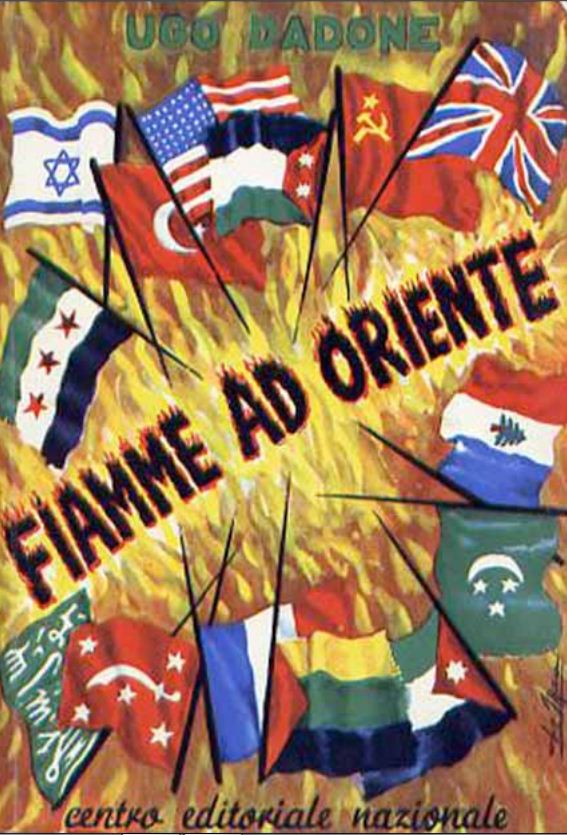
We are using conditionals in previous sentences on purpose as they are based on his own memories, which he told a year after the war to the U.S. war-crime investigators, who put them into files that were declassified by the CIA in 2007. During the interrogations in 1946, he was repeatedly mentioning his membership in the Scottish Rite Masonry. It did not really impress the American soldiers, although many of them might have been members of the same organisation. As stated in the note at the end of the file, they were aware of the fact that he could not even be a member for 20 years since 1925. In the second note, they only stated laconically that their other sources say that Ugo Dadone spent many months from 1941 till the summer of 1944 in the British internment camp in Cairo.
The distrust, which American investigators had after the war in Dadone’s adventurous stories did not influence their intelligence colleagues. Thus, we can find many stories from the aftermath of WWII of the co-founder of Freemasonry in Czechoslovakia in CIA archives, who hired the former Italian diplomat and used him as an information source. Ugo Dadone perhaps returned to Freemasonry; however, it could not bring back his honor and fame, which he gained ages ago in Czechoslovakia. In 1949, he settled in Rome and became a publisher of the gazette ‘Il Nazionale’. Oh, what a paradox! The journal called Národ! The circle has been closed. According to a historian, PhDr. Pavel Tomášek, we could find in reports of the Italian parliamentarian sessions, a reference to a press legal action, which was taken against him. In 1958, Ugo Dadone published his last book Fiamme ad Oriente, where he supposedly writes, among others, about the Czechoslovak policy in the matter of the creation of the Jewish state. He died in Rome in 1963.
